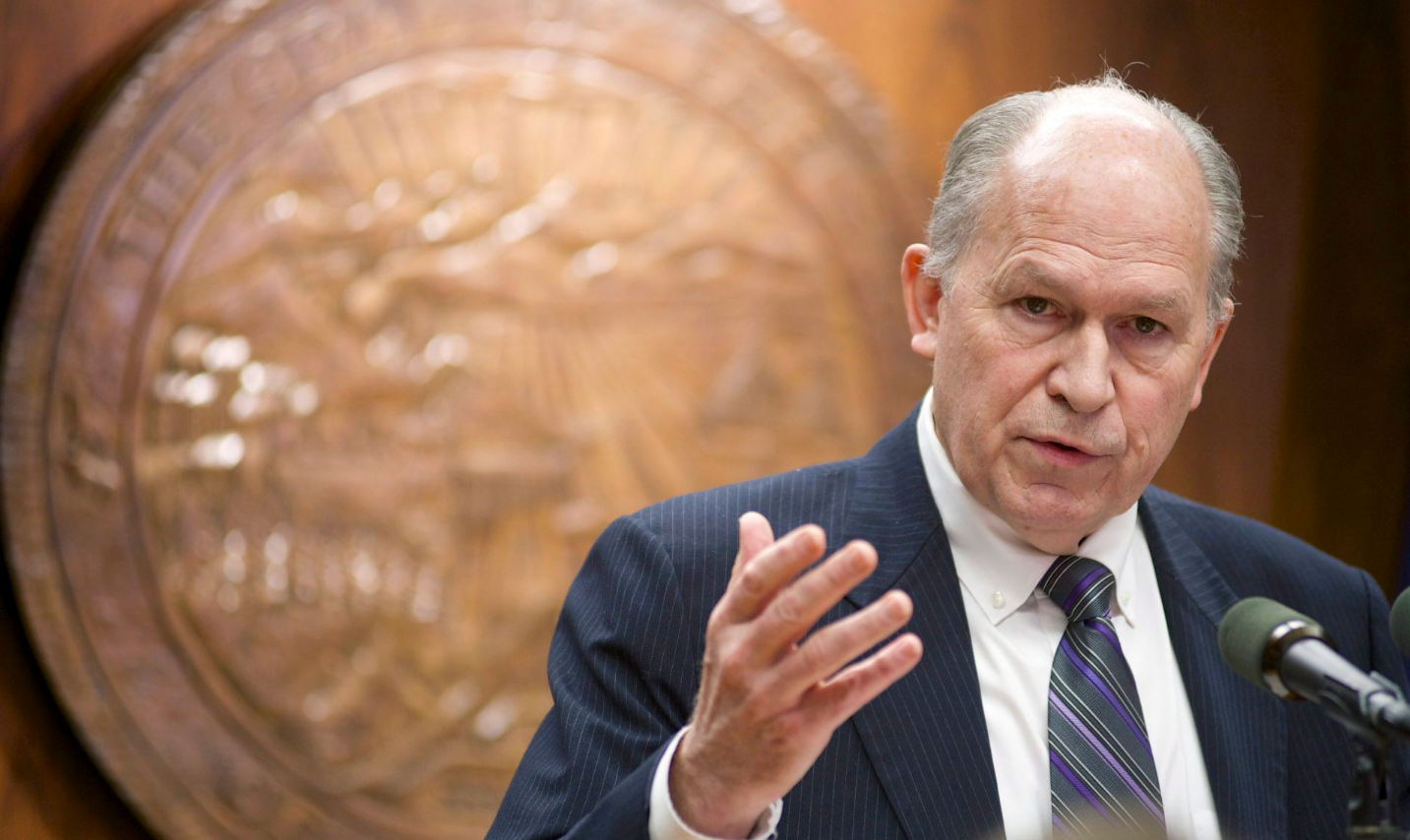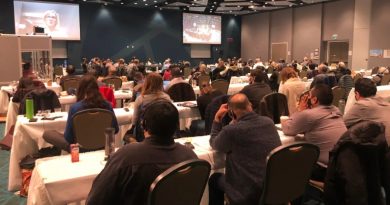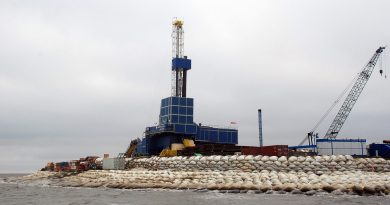Governor fends off criticism over Alaska LNG

Alaska Governor Bill Walker on Tuesday shot back at what he called “misstatements” about his pursuit of an Alaska-led gas project, decrying assertions by critics that he would force the leading North Slope oil producers to market gas by threatening to put them in default on their leases.
In an interview Tuesday, Walker also challenged criticism by legislators and Republican party officials that the proposed state takeover of the gas-line project was a sudden, ill-considered response to suggestions by the producers that they may not all stick with the project next year.
Rather, Walker said, he presented the idea to legislative leaders in early February, shortly after ExxonMobil and the state’s two other oil company partners in the gas line development, BP and ConocoPhillips, suggested Alaska lead the project.
“Go slow” approach not best choice
Alaska’s potential adoption of the lead role was a much better alternative than the other suggestion by the companies, Walker said — a “go slow” approach of waiting out the current low prices of oil and gas.
Walker has said he’s not interested in delays because the project needs to meet deadlines to ensure massive reserves of North Slope natural gas can be super-chilled, liquefied and shipped to Asia for sale.
Walker said he doesn’t see the state putting the lease owners of the state’s most productive oil field in default, addressing criticism that his administration would take such a step at Prudhoe Bay to force the lease owners — mainly BP, ConocoPhillips and Exxon — to market the huge gas reserves there.
Wednesday morning hearing
The House and Senate Resource Committees will hear testimony Wednesday morning from the Walker administration and Exxon on the gas line status. The hearing starts at 10 a.m. at the Anchorage Legislative Information Office on Fourth Avenue.
The state is scheduled to decide by July 1 whether it will approve the latest plan of development for the Initial Participating Area in Prudhoe Bay, responsible for close to half the state’s oil production.
The same companies working with the state in the Alaska LNG project are the major producers in the field. Walker’s administration for months has taken the unprecedented step of demanding information about how the companies will market their gas in the unit.
But Walker said the goal was never to declare the lease owners in default, which could lead to a takeover of the leases by the state — and a likely massive lawsuit. He said the companies have provided some information the state has sought and are still working closely with the state on additional questions.
“I don’t see putting them in default as being realistic at this point because there’s just too much discussion going on back and forth,” he said. “If they were completely stonewalling … but they’re not, they are being very forthcoming with information and discussions about it so I’m encouraged by that.”
Resource selling
Walker said he doesn’t view his demand for marketing information as aggressive because the state’s main oil-field regulator, the Alaska Oil and Gas Conservation Commission, has decided large amounts of gas can be removed daily for a pipeline project. At the same time, the need to use gas for reinjection into oil formations to help increase subsurface pressure and produce more oil will end in the future, leaving the gas available for sale.
“I don’t know any sovereign in the world, or anyone at all that doesn’t at some point say, ‘What are you going to do about selling this resource that is now in excess of what’s needed?'” he said. “I know I’ve been called (Hugo) Chavez (the radical Venezuela president, now dead) and whatnot for nationalizing the North Slope by saying, ‘Hey, what’s going on on the marketing side?’ It’s amazing how when nothing is asked for many, many years, and when finally when someone (asks) the questions, it gets a little bit out of proportion.”
As for the Alaska LNG project, Walker said the oil companies informed the state in a Feb. 9 meeting that they were probably not all going to move into the next costly planning phase of the project — Front End Engineering and Design — set to start in early 2017. The phase could cost the state and the oil company partners about $500 million apiece.
The engineering and design work would help the partners make a final decision on whether to move forward with the project that would be one of the world’s costliest, now estimated at $55 billion with an 800-mile pipeline and a gas-liquefaction plant contributing just part of the expense.
Monetizing gas
Walker said Tuesday he was thrilled the oil producers informed the state of their concerns and ideas a year before the decision on the next phase of engineering would be made. The companies also offered to help the state pursue it, including by exploring options such as a state-led project receiving tax-exempt financing and other tax benefits, he said.
“It was a moment for me. I was so appreciative of the producers doing that,” he said.
“They said you might want to look at another structure, where they would participate in a different way,” he said.
The companies also suggested participating as shippers or staying on with the project to help in construction and design, he said.
“We all want to monetize the gas,” he said. “Here we have the financial condition we’re in and we have trillions of dollars worth of resources that are stranded. We want to get it to the marketplace, so we all have the same alignment.”
Walker took the producers’ support as a positive sign indicating the companies’ desire to see a project completed so they could sell their gas.
“And that’s a good thing,” he said. “Some have offered to go to the market with us and join us in the market and sit side by side to talk about the opportunities in Alaska. We’re very appreciative of that.”
Producers weigh in
Kim Jordan, a spokeswoman with ExxonMobil in Alaska, said she was not in the room in the February meeting and was not aware of what, if any, specific ideas were suggested.
But broad suggestions from the producers stemmed from a letter from the governor in January when he said he wanted certain actions and agreements completed before the end of the legislative session in April.
The suggestions did not include a long-term fiscal agreement on petroleum taxes and royalties as one of the goals, something Exxon has said will help underpin the project’s financial outlook and is a key step producers need before the project can move into its next planning phase, Jordan said.
“All of those agreements and actions didn’t occur prior to the end of the 2016 regular (legislative) session,” Jordan in a written statement Tuesday. “Nor has a constitutional amendment, as proposed by the Walker administration, been progressed this year to support fiscal stability.”
Once it became clear the governor’s goals wouldn’t be met, the oil companies and the state discussed other concepts for the project, she said.
Financing misconceptions
One option was “pacing the Alaska LNG project work with current market conditions” and continuing to work on regulatory permitting, cost reductions and the agreements the governor and producers sought.
The other option was “working collaboratively with the administration to explore other options that would provide access to our share of North Slope natural gas, if the state elected to pursue an alternative project structure,” Jordan said.
Walker said Tuesday another misperception about the project involves the potential financing.
“Some people seem to think we reach over in the Permanent Fund and draw out money for that,” he said. “Absolutely not. That is probably the worst way to do the financing. And first it would require a vote of the people to do that, so no one could do that unilaterally, and I would not recommend that.”
“I recommend this be done (based) on long-term contracts,” he said, with strong deals with buyers providing the expectation of future revenues that attracts investments.
All options considered
Walker said that days after the oil companies expressed concern about moving forward with the project, he met with legislative leaders on Feb. 16, including Sen. Cathy Giessel, R-Anchorage, chair of the Senate Resources Committee.
Giessel was quoted this week in the Alaska Journal of Commerce as saying that she had not been previously informed that the governor was considering a go-it-alone approach.
“There was vague reference to consideration of the state of Alaska taking a ‘bigger role,’ ” Giessel said of the February meeting, in a text to Alaska Dispatch News. “No specifics of what that meant were offered. It was specifically asked whether he was suggesting a ‘go-it-alone’ scenario. I recall him saying he envisioned continued partnership with 1 or 2 of the producer partners.”
Katie Marquette, a spokeswoman in the governor’s office, said that’s incorrect.
“The governor had said all options would be considered. The governor said one is the state going it alone, and that another is to lead the project with market participants,” she said.
Walker said that to portray his efforts as though he’s “sort of ripping this out of the hands of the producers is 100 percent incorrect.”
The same people who are criticizing him also sought to build a gas pipeline through Canada to the Lower 48 for years, an effort that has been abandoned because natural gas from the shale boom ruined the market for Alaska’s gas in the U.S.
“There will be people who will be very upset when we build a pipeline,” and fulfill a decades-old state goal, he said.
Related stories from around the North:
Canada: Energy challenges in Canada’s North, Eye on the Arctic
China: Chinese mega-deals in Yamal LNG, The Independent Barents Observer
Norway: OMV finds more oil in Barents Sea, The Independent Barents Observer
Russia: Big interest in new Arctic LNG: Novatek, The Independent Barents Observer
Sweden: Sweden to have 100 percent renewable energy by 2040, Radio Sweden
United States: Alaska pipeline proposal raises eyebrows, Alaska Public Radio Network



